- Home
- Don DeLillo
Falling Man Page 19
Falling Man Read online
Page 19
Her father wasn’t buried in a windy churchyard under bare trees. Jack was in a marble vault high on a wall in a mausoleum complex outside Boston with several hundred others, all chambered in tiers, floor to ceiling.
She came across the obituary late one night, looking at a newspaper that was six days old.
They die every day, Keith said once. There’s no news in that.
He was back in Las Vegas now and she was in bed, flipping the pages, reading the obits. The force of this obituary did not register at once. A man named David Janiak, 39. The account of his life and death was brief and sketchy, written in haste to make a deadline, she thought. She thought there would be a complete report in the paper of the following day. There was no photograph, not of the man and not of the acts that had made him, for a time, a notorious figure. These acts were noted in a single sentence, pointing out that he was the performance artist known as Falling Man.
She let the paper slip to the floor and turned off the light. She lay in bed, head propped on a couple of pillows. A car alarm began to sound down the street. She reached back for the pillow nearest her and dropped it on top of the newspaper and then lay back, breathing evenly, eyes still open. After a while she closed her eyes. Sleep was out there somewhere over the curve of the earth.
She waited for the car alarm to stop. When it stopped she turned on the light and got out of bed and went to the living room. There was a stack of old newspapers in a wicker basket. She looked for the five-day-old paper, which was the paper of the following day, but could not find it, whole or part, read or unread. She sat in the chair next to the basket waiting for something to happen or stop happening, a noise, a drone, an appliance, before she went to the computer in the next room.
The advanced search took no time. There he was, David Janiak, in pictures and print.
Dangling from the balcony of an apartment building on Central Park West.
Suspended from the roof of a loft building in the Williamsburg section of Brooklyn.
Dangling from the flies at Carnegie Hall during a concert, string section scattered.
Dangling over the East River from the Queensboro Bridge.
Sitting in the back seat of a police car.
Standing on the rail of a terrace.
Dangling from the bell tower of a church in the Bronx.
Dead at 39, apparently of natural causes.
He’d been arrested at various times for criminal trespass, reckless endangerment and disorderly conduct. He’d been beaten by a group of men outside a bar in Queens.
She clicked forward to the transcript of a panel discussion at the New School. Falling Man as Heartless Exhibitionist or Brave New Chronicler of the Age of Terror.
She read a few remarks, then stopped reading. She clicked forward to entries in Russian and other Slavic languages. She stared into the keyboard for a time.
Photographed being outfitted with a safety harness, an associate trying to shield him from the camera.
Photographed with bloody face in hotel lobby.
Dangling from parapet of tenement in Chinatown.
All his falls were headfirst, none announced in advance. The performance pieces were not designed to be recorded by a photographer. Those pictures that exist were taken by people who happened to be at the site or by a professional alerted to the event by a passerby.
He studied acting and dramaturgy at the Institute for Advanced Theatre Training in Cambridge, Massachusetts. His training included a three-month residency at the Moscow Art Theatre School.
Dead at 39. No sign of foul play. Suffered from a heart ailment and high blood pressure.
He worked without pulleys, cables or wires. Safety harness only. And no bungee cord to absorb the shock of longer falls. Just an arrangement of straps under the dress shirt and blue suit with one strand emerging from a trouser leg and extending back to a secure structure at the top of the fall.
Most charges dismissed. Fines and warnings issued.
She came across another burst of foreign languages, many words decorated with acute accents, circumflexes and other marks whose names she couldn’t think of.
She looked into the screen waiting for a sound in the street, car brakes, car alarm, that would get her out of the room and back into bed.
His brother, Roman Janiak, a software engineer, assisted with most jumps, becoming visible to onlookers only when it was unavoidable. Plans for a final fall, according to him, did not include a safety harness.
She thought it could be the name of a trump card in a tarot deck, Falling Man, name in gothic type, the figure twisting down in a stormy night sky.
There is some dispute over the issue of the position he assumed during the fall, the position he maintained in his suspended state. Was this position intended to reflect the body posture of a particular man who was photographed falling from the north tower of the World Trade Center, headfirst, arms at his sides, one leg bent, a man set forever in free fall against the looming background of the column panels in the tower?
Free fall is the fall of a body within the atmosphere without a drag-producing device such as a parachute. It is the ideal falling motion of a body that is subject only to the earth’s gravitational field.
She did not read further but knew at once which photograph the account referred to. It hit her hard when she first saw it, the day after, in the newspaper. The man headlong, the towers behind him. The mass of the towers filled the frame of the picture. The man falling, the towers contiguous, she thought, behind him. The enormous soaring lines, the vertical column stripes. The man with blood on his shirt, she thought, or burn marks, and the effect of the columns behind him, the composition, she thought, darker stripes for the nearer tower, the north, lighter for the other, and the mass, the immensity of it, and the man set almost precisely between the rows of darker and lighter stripes. Headlong, free fall, she thought, and this picture burned a hole in her mind and heart, dear God, he was a falling angel and his beauty was horrific.
She clicked forward and there was the picture. She looked away, into the keyboard. It is the ideal falling motion of a body.
The preliminary finding is death from natural causes, pending an autopsy and toxicological report. Suffered from chronic depression due to a spinal condition.
If this photograph was an element in his performances he said nothing about it when questioned by reporters after one of his arrests. He said nothing when asked whether anyone close to him had been lost in the attacks. He had no comments to make to the media on any subject.
Suspended from the railing of a roof garden in Tribeca.
Dangling from a footbridge over the FDR Drive.
MAYOR SAYS FALL MAN MORONIC.
He turned down an invitation to fall from the upper reaches of the Guggenheim Museum at scheduled intervals over a three-week period. He turned down invitations to speak at the Japan Society, the New York Public Library and cultural organizations in Europe.
His falls were said to be painful and highly dangerous due to the rudimentary equipment he used.
His body was discovered by his brother, Roman Janiak, a software engineer. The Saginaw County medical examiner’s office reports this was an apparent coronary event, tests pending.
His training included formal classes six days a week in both Cambridge and Moscow. Graduating actors gave a showcase presentation in New York for casting directors, artistic directors, agents and others. David Janiak, as a Brechtian dwarf, assaulted another actor, seemingly trying to rip the man’s tongue out of his mouth during what was supposed to be a structured improvisation.
She clicked forward. She tried to connect this man to the moment when she’d stood beneath the elevated tracks, nearly three years ago, watching someone prepare to fall from a maintenance platform as the train went past. There were no photographs of that fall. She was the photograph, the photosensitive surface. That nameless body coming down, this was hers to record and absorb.
Early in 2003 he began to reduce the number
of performances and tended to appear only in remote parts of the city. Then the performances stopped.
He injured his back so badly in one of the falls that he had to be hospitalized. Police arrested him at the hospital for obstructing vehicular traffic and creating a hazardous or physically offensive condition.
Plans for his final jump at some unforeseen future time did not include a harness, according to his brother Roman Janiak, 44, who spoke to a reporter shortly after he identified the body.
Students at the Institute create their own movement vocabulary and maintenance program to follow throughout their careers. Study includes psychophysical exercises, Meyerhold’s biomechanics, Grotowski training, Vakhtangov’s plasticity training, individual and partner acrobatics, classical and historical dance, style and genre explorations, Dalcroze eurythmics, impulse work, slow motion, fencing, armed and unarmed stage combat.
It is not immediately known what brought David Janiak to a motel outside the small town more than five hundred miles from the site of the World Trade Center.
She looked into the keyboard. The man eluded her. All she knew was what she’d seen and felt that day near the schoolyard, a boy bouncing a basketball and a teacher with a whistle on a string. She could believe she knew these people, and all the others she’d seen and heard that afternoon, but not the man who’d stood above her, detailed and looming.
She went to sleep finally on her husband’s side of the bed.
14
There were rare moments between hands when he sat and listened to the sounds around him. It surprised him every time to find what an effort it takes to hear what is always there. The chips were there. Behind the ambient noise and stray voices, there was the sound of tossed chips, raked chips, forty or fifty tables of people stacking chips, fingers reading and counting, balancing the stacks, clay chips with smooth edges, rubbing, sliding, clicking, days and nights of distant hiss, like insect friction.
He was fitting into something that was made to his shape. He was never more himself than in these rooms, with a dealer crying out a vacancy at table seventeen. He was looking at pocket tens, waiting for the turn. These were the times when there was nothing outside, no flash of history or memory that he might unknowingly summon in the routine run of cards.
He walked down the wide aisle hearing the mutter of stickmen at the dice tables, a shout now and then from the sports book. Sometimes a hotel guest wheeling a suitcase wandered through, looking lost in Swaziland. In the off-hours he talked to dealers at empty blackjack tables, always the women, waiting in some zone of purged sensation. He might play a while, sitting and talking, making a point of not getting interested in the woman herself, just her conversation, fragments of life outside, her car trouble, her daughter Nadia’s riding lessons. He was one of them in a way, casino staff, passing some forgettable social moments before the action starts again.
It would all go flat at the end of the night, win or lose, but that was part of the process, the turn card, the river card, the blinking woman. Days fade, nights drag on, check-and-raise, wake-and-sleep. The blinking woman was gone one day and that was the end of her. She was stale air. He could not place her elsewhere, at a bus stop, in a mall, and saw no point in trying.
He wondered if he was becoming a self-operating mechanism, like a humanoid robot that understands two hundred voice commands, far-seeing, touch-sensitive but totally, rigidly controllable.
He’s estimating medium-ace across the table, the man in mirrored sunglasses.
Or a robot dog with infrared sensors and a pause button, subject to seventy-five voice commands.
Raise before the flop. Hit early and hard.
There was no fitness center in his hotel. He found a gym not far away and worked out when there was time. No one used the rowing machine. He half hated the thing, it made him angry, but he felt the intensity of the workout, the need to pull and strain, set his body against a sleek dumb punishing piece of steel and cable.
He rented a car and took a drive in the desert, starting back after dark and then climbing a rise and leveling out. It took him a moment to understand what he was looking at, many miles ahead, the city floating on the night, a feverish sprawl of light so quick and inexplicable it seemed a kind of delirium. He wondered why he’d never thought of himself in the middle of such a thing, living there more or less. He lived in rooms, that’s why. He lived and worked in this room and that. He moved only marginally, room to room. He took a taxi to and from the downtown street where his hotel was located, a place without floor mosaics and heated towel racks, and he hadn’t known until now, looking at that vast band of trembling desert neon, how strange a life he was living. But only from here, out away from it. In the thing itself, down close, in the tight eyes around the table, there was nothing that was not normal.
He was avoiding Terry Cheng. He didn’t want to talk to him, or listen, or watch his cigarette burn down.
The lucky jack did not fall.
He didn’t listen to what was said around him, the incidental bounce of dialogue, player to player. A fresh deck rose to the tabletop. He was gutted by fatigue at times, in a near feral state, eyes sweeping the table before the cards were dealt.
He used to think about Florence Givens every day. He still did, most days, today, in a taxi, staring at a billboard. He’d never called. He’d never thought of crossing the park again to see her, talk a while, find out how she was doing. He’d thought of it in a remote way, like landscape, like thinking of going back to the house where you grew up and walking along the back lanes and across the high meadow, the kind of thing you know you’ll never do.
It was finally who he was that counted, not luck or naked skill. It was strength of mind, mental edge, but not just that. There was something harder to name, a narrowness of need or wish, or how a man’s character determines his line of sight. These things would make him win but not too much, not winnings of such proportions that he’d slip into someone else’s skin.
The dwarf is back, Carlo, and he is happy to see this, watching the man take a seat two tables away. But he doesn’t look around the room for a sign of Terry Cheng so they might trade wry smiles.
Men in stylized yawns with arms raised, men staring into dead space.
Terry might be in Santa Fe or Sydney or Dallas. Terry might be in his room dead. It took Terry two weeks to understand that the fixture on the wall at one end of the long room, marked SHEER and BULK, was designed to operate the curtains at the other end of the room, to open and close the sheer inner curtain or the bulky outer. Terry had tried to open the curtains once by hand and then realized it didn’t matter, open or closed. There was nothing out there he needed to know.
He’d never told Lianne about the walks across the park. His experience with Florence was brief, maybe four or five encounters over a period of fifteen days. Is that possible, only that? He tried counting the times, sitting in a taxi at a stoplight, staring at a billboard. It all ran together now, with only the faint grain of something felt and held. He saw her in the tower as she’d described it, in forced march down the stairwell, and thought he saw himself at times, in split instants, unshaped, a false memory or too warped and fleeting to be false.
The money mattered but not so much. The game mattered, the touch of felt beneath the hands, the way the dealer burnt one card, dealt the next. He wasn’t playing for the money. He was playing for the chips. The value of each chip had only hazy meaning. It was the disk itself that mattered, the color itself. There was the laughing man at the far end of the room. There was the fact that they would all be dead one day. He wanted to rake in chips and stack them. The game mattered, the stacking of chips, the eye count, the play and dance of hand and eye. He was identical with these things.
He set the resistance level way up. He stroked hard, arms and legs but mostly legs, trying not to collapse his shoulders, hating every stroke. Sometimes there was no one else in the place, maybe somebody on a treadmill watching TV. He always used the rowing machine. He rowed
and showered and the showers smelled of mildew. He stopped going after a while but then went back, setting the level higher still, wondering only once why this was a thing he had to do.
He was looking at five-deuce off-suit. He thought for a moment he might get up and leave. He thought he might walk out and get the first plane, pack and go, get a window seat and lower the shade and fall asleep. He folded his cards and sat back. By the time a fresh deck floated up he was ready to play again.
Forty tables, nine players a table, others waiting at the rail, screens high on three walls showing soccer and baseball, strictly atmospheric.
SHEER and BULK.
He didn’t want to listen to Terry Cheng at his conversational ease, in his new persona, chatting away by the blue waterfall, three years after the planes.
Older men with chapped faces, eyelids drawn down. Would he know them if he saw them in a diner, eating breakfast at the next table? Long lifetimes of spare motion, sparer words, call the bet, see the raise, two or three such faces every day, men nearly unnoticeable. But they gave the game a niche in time, in the lore of poker face and dead man’s hand, and a breath of self-esteem.
The waterfall was blue now, or possibly always was, or this was another waterfall or another hotel.
You have to break through the structure of your own stonework habit just to make yourself listen. There it is, the clink of chips, the toss and scatter, players and dealers, mass and stack, a light ringing sound so native to the occasion it lies outside the aural surround, in its own current of air, and no one hears it but you.
Here’s Terry slouching down a side aisle at three a.m. and they barely share a glance and Terry Cheng says, “Have to get back to my coffin by sunup.”
The woman from wherever she’s from, in the black leather cap, Bangkok or Singapore or L.A. She wears the cap slightly tilted and he knows they’re all so neutralized by the steady throb of call and fold that there’s very little happening, table-wide, in the popular art of fantasy fuck.

 Great Jones Street (Contemporary American Fiction)
Great Jones Street (Contemporary American Fiction) Americana
Americana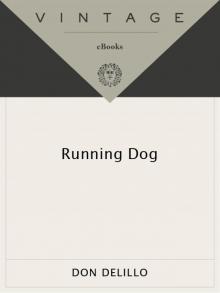 Running Dog
Running Dog Libra
Libra End Zone
End Zone Ratner's Star
Ratner's Star Underworld
Underworld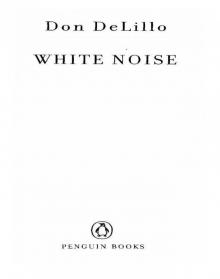 White Noise
White Noise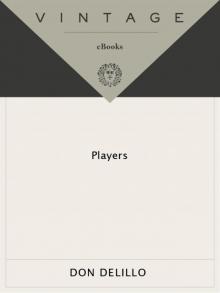 Players
Players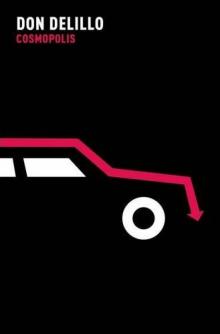 Cosmopolis
Cosmopolis The Silence
The Silence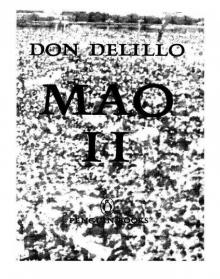 Mao II
Mao II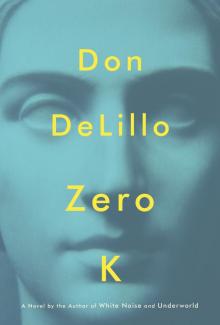 Zero K
Zero K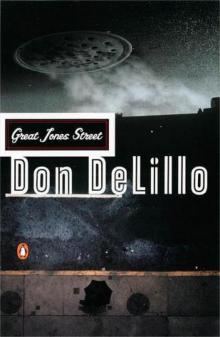 Great Jones Street
Great Jones Street The Angel Esmeralda
The Angel Esmeralda The Names
The Names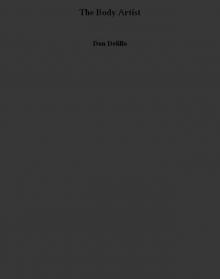 The Body Artist
The Body Artist Point Omega
Point Omega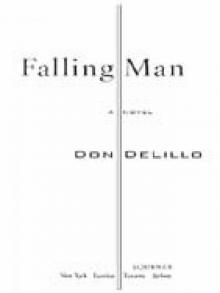 Falling Man
Falling Man